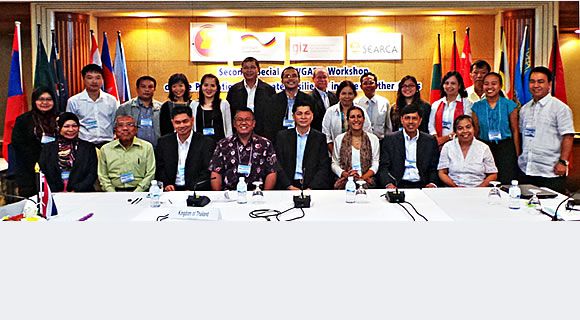The Deutsche Gesellschaft für Internationale Zusammenarbeit (GIZ) GmbH and the Southeast Asian Regional Center for Graduate Study and Research in Agriculture (SEARCA) presented the preliminary findings of the national case studies of the pilot ASEAN Member States (AMS), namely: Cambodia, Indonesia, Lao PDR, Myanmar, the Philippines, Thailand, and Vietnam on climate resilience of rice, corn, and cassava. The workshop also aimed at sharing information, identifying, and exchanging climate change adaptation best practices among the AMS; identifying regional areas of collaboration; and providing technical input and exchange among the AMS.
It brought together the ATWGARD focal persons from Brunei Darussalam, Cambodia, Indonesia, Lao PDR, Myanmar, the Philippines, Thailand, and Vietnam. The Department of Agriculture (DoA), under the Thailand Ministry of Agriculture and Cooperatives (MOAC), hosted the workshop in coordination with the ASEAN Secretariat (ASEC).
The ASEAN Network on Promoting Climate Resilience of Rice and Other Crops, through the ASEAN GAP-CC, was funded by GIZ in which SEARCA was commissioned to carry out the project in seven AMS. This is in support of the initiative proposed by Thailand and adopted by ATWGARD, which aims to advance the ASEAN Integrated Food Security (AIFS) and the ASEAN Multi-Sectoral Framework on Climate Change: Agriculture and Forestry towards Food Security (AFCC).
Dr. Felino P. Lansigan, SEARCA Regional Agricultural Value Chain/Climate Resilience Expert, Ms. Myriam Fernando (Senior Advisor, GAP-CC), and Mr. Michael Sheinkman from the Climate Change, Agriculture and Food Security (CCAFS) served as resources persons.
In Dr. Lansigan’s presentation on the consolidated regional findings, the following commonalities on climate change adaptation (CCA) good practices among the AMS were highlighted: (1) the use of adaptive planting calendar; (2) planting of improved and stress-tolerant varieties, technologies/techniques for water use efficiency, e.g., Alternate Wetting and Drying (AWD); (3) crop diversification to include changing crops/commodities (e.g., shrimp farming in MRD); and (4) climate risk management via insurance.
The following recommendations on CCA areas for regional collaboration for the climate resilient network’s consideration after the project implementation in 2015 were also brought forward by Dr. Lansigan: (1) CCA information sharing and technology transfer should be promoted within and among AMS; (2) CCA practices should be integrated with other farm production activities; (3) Capacity building programs should be implemented for local executives and planners, trainors, and local stakeholders; (4) Action Research and Development (R&D) on CCA should be conducted for action planning and crop production inputs; and (5) CCA R&D collaboration and partnership must be established with dialogue partners and international organizations.
Ms. Imelda L. Batangantang, Program Associate, and Ms. Kristine Joy S. Villagracia, Regional Knowledge Platform Coordinator of SEARCA’s Project Development and Management Department (ProDev) provided support during the event.

 BANGKOK, Thailand - The ASEAN Technical Working Group on Agriculture and Research Development (ATWGARD) once again took up the Promotion of Climate Resilience in Rice and Other Crops in its 2ndSpecial Workshop, which was held on 17 June 2014 at Rama Gardens Hotel in Bangkok, Thailand.
BANGKOK, Thailand - The ASEAN Technical Working Group on Agriculture and Research Development (ATWGARD) once again took up the Promotion of Climate Resilience in Rice and Other Crops in its 2ndSpecial Workshop, which was held on 17 June 2014 at Rama Gardens Hotel in Bangkok, Thailand.











